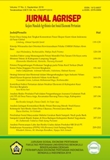Main Article Content
Abstract
The changes that occur in the community with the presence of the waste bank program will undoubtedly pass through a process that takes place gradually and involves the role of the independent agency that is very unusual. Therefore, the research objectives here is to analyze the stages of changes going on in society as a result of the existence of the Waste Bank and parse variables agent role in those changes. This research used the qualitative method with descriptive, i.e., design studies that give a picture carefully regarding certain individuals or groups about the circumstances and symptoms occur and then be matched with the prevailing theory. Data collection is done by observation and FGD. Persistence and effort drive the large and structured society that eventually led to the results shown by the number of benefits obtained with the existence of waste bank. The strategy that carried Gemah Ripah waste Bank to remain active up to now serve with the emphasis on children's education, do innovations, using such modern bank management, expand networks and provide socialization and accompaniment to the new waste banks.
Article Details
Authors who publish with this journal agree with the following terms:
- Authors retain copyright and grant the journal right of first publication with the work simultaneously licensed under a Creative Commons Attribution-ShareAlike 4.0 International License that allows others to share the work with an acknowledgment of the work's authorship and initial publication in this journal.
- Authors are able to enter into separate, additional contractual arrangements for the non-exclusive distribution of the journal's published version of the work (e.g., post it to an institutional repository or publish it in a book), with an acknowledgment of its initial publication in this journal.
- Authors are permitted and encouraged to post their work online (e.g., in institutional repositories or on their website) prior to and during the submission process, as it can lead to productive exchanges, as well as earlier and greater citation of published work (See The Effect of Open Access).
- This work is licensed under a Creative Commons Attribution-ShareAlike 4.0 International License.
References
- Afiff, Faisal. 2013. Alternatif Model Manajemen Perubahan. Diunduh dari http://www.fe.unpad.ac.id pada 16 Desember 2014.
- Asteria, D. dan M, Heruman. 2016. Bank Sampah sebagai Alternatif Strategi Pengelolaan Sampah Berbasis Masyarakat di Tasikmalaya. Jurnal Manusia dan Lingkungan. 23(1):136-141. Maret 2016.
- Kurniawati, D.P., B. Supriyono., dan I. Hanafi. 2013. Pemberdayaan Masyarakat di Bidang Usaha Ekonomi, Jurnal Administrasi Publik. 1(4):9-14.
- Mardikanto, Totok. 2009. Sistem Penyuluhan Pertanian, Surakarta: LPP-UNS dan UNS Press.
- Melyanti, I.M. 2014. Pola Kemitraan Pemerintah, Civil Society, dan Swasta dalam Program Bank Sampah di Pasar Baru Kota Probolinggo. Jurnal Kebijakan dan Manajemen Publik. 2(1): Januari 2014.
- Miles, M.B., dan A.M. Huberman. 1992. Analisa Data Kualitatif: Buku Sumber Tentang Metode-metode Baru, Jakarta: UI –Press.
- Miradj, S. dan Sumarmo. 2014. Pemberdayaan Masyarakat Miskin Melalui Proses Pendidikan Nonformal Upaya Meningkatkan Kesejahteraan Sosial di Kabupaten Halmahera Barat, Jurnal Pendidikan dan Pemberdayaan Masyarakat, 1(1):101-112. Maret 2014.
- Puspitawati,Y. dan M. Rahdriawan. 2012. Kajian Pengelolaan Sampah Berbasis Masyarakat dengan Konsep 3R di Kelurahan Larangan Kota Cirebon. Jurnal Pembangunan Wilayah dan Kota 8(4): 349-359. Desember 2012.
- Ranjabar, Jacobus. 2015. Perubahan Sosial. Teori-teori dan Proses Perubahan Sosial serta Teori Pembangunan, Bandung: Alfabeta.
- Syafrini, D. 2013. Bank Sampah: Mekanisme Pendorong Perubahan dalam Kehidupan Masyarakat. Jurnal Humanus. Vol. 12 No.2 2013 155-167.
- Sztompka, P. 2014. Sosiologi Perubahan Sosial, Jakarta: Prenada
- Triyono,A. 2014. Pemberdayaan Masyarakat Melalui Community Development Program Posdaya PT. Holcim Indonesia Tbk. Pabrik Cilacap. Komuniti, 6(2):111-121. September 2014.
References
Afiff, Faisal. 2013. Alternatif Model Manajemen Perubahan. Diunduh dari http://www.fe.unpad.ac.id pada 16 Desember 2014.
Asteria, D. dan M, Heruman. 2016. Bank Sampah sebagai Alternatif Strategi Pengelolaan Sampah Berbasis Masyarakat di Tasikmalaya. Jurnal Manusia dan Lingkungan. 23(1):136-141. Maret 2016.
Kurniawati, D.P., B. Supriyono., dan I. Hanafi. 2013. Pemberdayaan Masyarakat di Bidang Usaha Ekonomi, Jurnal Administrasi Publik. 1(4):9-14.
Mardikanto, Totok. 2009. Sistem Penyuluhan Pertanian, Surakarta: LPP-UNS dan UNS Press.
Melyanti, I.M. 2014. Pola Kemitraan Pemerintah, Civil Society, dan Swasta dalam Program Bank Sampah di Pasar Baru Kota Probolinggo. Jurnal Kebijakan dan Manajemen Publik. 2(1): Januari 2014.
Miles, M.B., dan A.M. Huberman. 1992. Analisa Data Kualitatif: Buku Sumber Tentang Metode-metode Baru, Jakarta: UI –Press.
Miradj, S. dan Sumarmo. 2014. Pemberdayaan Masyarakat Miskin Melalui Proses Pendidikan Nonformal Upaya Meningkatkan Kesejahteraan Sosial di Kabupaten Halmahera Barat, Jurnal Pendidikan dan Pemberdayaan Masyarakat, 1(1):101-112. Maret 2014.
Puspitawati,Y. dan M. Rahdriawan. 2012. Kajian Pengelolaan Sampah Berbasis Masyarakat dengan Konsep 3R di Kelurahan Larangan Kota Cirebon. Jurnal Pembangunan Wilayah dan Kota 8(4): 349-359. Desember 2012.
Ranjabar, Jacobus. 2015. Perubahan Sosial. Teori-teori dan Proses Perubahan Sosial serta Teori Pembangunan, Bandung: Alfabeta.
Syafrini, D. 2013. Bank Sampah: Mekanisme Pendorong Perubahan dalam Kehidupan Masyarakat. Jurnal Humanus. Vol. 12 No.2 2013 155-167.
Sztompka, P. 2014. Sosiologi Perubahan Sosial, Jakarta: Prenada
Triyono,A. 2014. Pemberdayaan Masyarakat Melalui Community Development Program Posdaya PT. Holcim Indonesia Tbk. Pabrik Cilacap. Komuniti, 6(2):111-121. September 2014.
